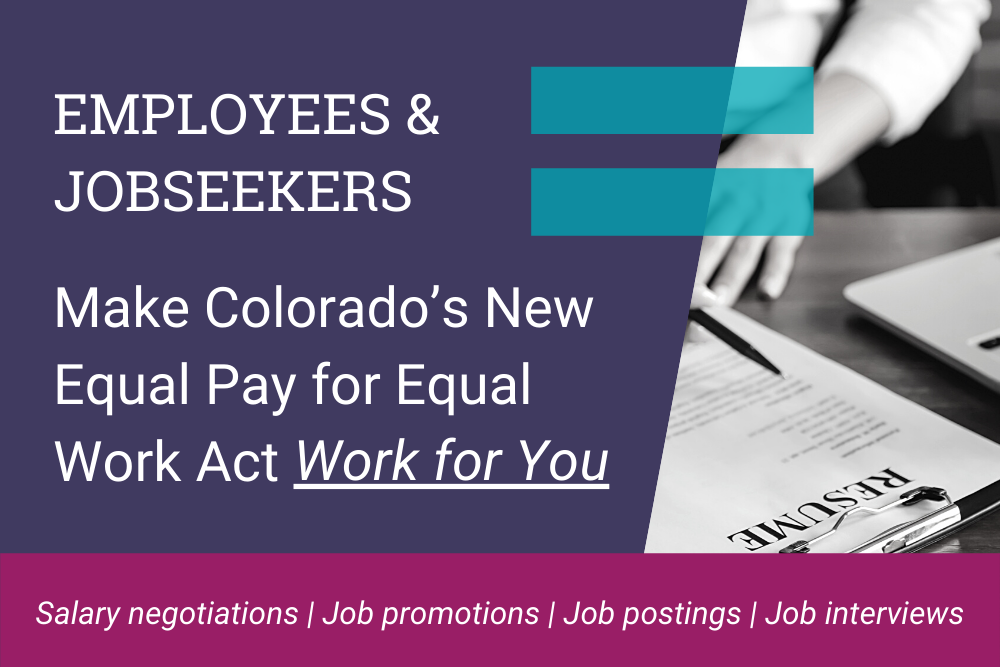
5 Things to Know About CO’s New Law that Helps Close the Wage Gap
Colorado Enacts Equal Pay for Equal Work Act
Watch the webinar for jobseekers and employees
January 1, 2021 marks a huge step in closing the wage gap for women in Colorado. The Equal Pay for Equal Work Act (EPEWA) went into effect for all employers in Colorado, expanding existing protections against pay discrimination on the basis of sex and providing increased transparency and visibility into compensation and promotion practices.
A step closer: Closing the wage gap
Despite the 1963 Federal Equal Pay Act outlawing of gender-based pay discrimination, not much progress has been made due to loopholes in the law, inadequate remedies, and unfavorable court rulings. In fact, many studies show that the wage gap has actually worsened. In 2018, women in Colorado were paid 86 cents on average for every dollar paid to men—with Black women earning 63 cents and Latinas earning just 54 cents. Compounded over a lifetime, this wage disparity equates to Colorado women losing $400,000 to $1 million in income.
The Colorado EPEWA addresses gaps in federal law and extends protections to ensure that employees with similar job duties are paid the same wage rate, regardless of sex (including gender identity) or another protected status.
The Women’s Foundation of Colorado, which spent many years lobbying for this legislation, has encapsulated the key pieces about the bill you need to know as an employee and/or jobseeker. You can also watch the webinar below that we hosted with the Colorado Women’s Bar Association on January 29, 2021.
5 key facts about the Equal Pay for Equal Work Act
- EPEWA protects just about everyone. The EPEWA makes clear that pay inequities based on gender and other protected status characteristics, including gender identity and race, are prohibited. For instance, this means that it is unlawful for employers to pay Black or Latina women, and those identifying as women, less for doing substantially similar work to men or other women. The law also covers men in that it can help ensure that men of color are also provided with the same equal pay protections.
- Employees are protected when talking about wages. It is now illegal for employers to prohibit employees from talking about pay with other employees. In fact, employees are expressly entitled to discuss, compare, and inquire about compensation. In addition, it is illegal for employers to retaliate against any employee for discussing, disclosing, or comparing wages with others. This provision also covers men who advocate for women, also protecting them against employer retaliation.
- Inquiring about pay history is not permitted. Employers can’t ask for or rely on a prospective employee’s prior pay. In fact, the EPEWA prohibits an employer from relying on a candidate’s earning history to determine a new wage rate. This change can help provide a fresh start for women who have previously been underpaid when they apply for new jobs.
- Salary ranges must be listed in job postings. To help ensure transparency, the EPEWA requires all employers to disclose a salary/hourly compensation range in each internal or external job posting. The information must also include a general description of all of the benefits and other compensation that will be offered to the hired applicant.
- Transparency required in opportunities for promotion. Employers are now required to internally post job and promotion opportunities to all employees on the same day, prior to a promotion decision being made. This is so all employees know about opportunities for promotion and have time to apply before the position is filled.
You can still watch the webinar that brings these scenarios to life
More than 300 jobseekers, employees, and others joined the “Making the Equal Pay for Equal Work Act (EPEWA) Work for You in 2021” webinar, hosted by WFCO and the Colorado Women’s Bar Association. We partnered in advocating for the passage of this 2019 monumental piece of legislation, which went into effect for all employers in Colorado on January 1, 2021. The parts of the bill that we called out above are illustrated through short videos, and attorneys who worked on the bill, answer key questions from audience.
46 percent of Colorado women are the breadwinners or co-breadwinners in their families. When economic opportunities improve for them, families and communities thrive and rise. The EPEWA takes a huge step forward in closing the long-lasting wage gap and building a more robust, equitable economy in Colorado.
Additional Resources:
- Watch an Equal Pay webinar for employers
- Read the bill summary
- Colorado Department of Labor and Employment Equal Pay Info and Claims Form
- Colorado Department of Labor and Employment Equal Pay Info for Transparency in Pay and Opportunities for Promotion and Advancement
- Equal Pay for Equal Work Act – A Crash Course

